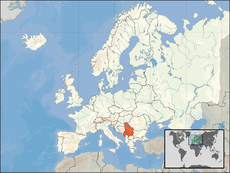United Nations Security Council Resolution 777
| UN Security Council Resolution 777 | ||
|---|---|---|
 Federal Republic of Yugoslavia | ||
| Date | 19 September 1992 | |
| Meeting no. | 3,116 | |
| Code | S/RES/777 (Document) | |
| Subject | Federal Republic of Yugoslavia | |
Voting summary |
| |
| Result | Adopted | |
| Security Council composition | ||
Permanent members | ||
Non-permanent members | ||
| ||
United Nations Security Council resolution 777, adopted unanimously on 19 September 1992, after reaffirming Resolution 713 (1992) and all subsequent resolutions on the topic, the Council considered that, as the state known as the Socialist Federal Republic of Yugoslavia (SFRY) ceased to exist, it noted that under Resolution 757 (1992), the claim by the Federal Republic of Yugoslavia (Serbia and Montenegro) to continue automatic membership in the United Nations was not widely accepted and so determined that membership of the SFRY in the United Nations cannot continue. Therefore, the Council recommended to the General Assembly that the Federal Republic of Yugoslavia (Serbia and Montenegro) cease participation in the General Assembly and apply for membership in the United Nations.
The original draft resolution, by the United States, stated that the General Assembly confirm that "Yugoslavia's membership in the United Nations be extinguished", however this was removed in order to obtain Russian support and the resolution itself remained open to interpretation.[1] Russia and China had rejected the idea that the Federal Republic of Yugoslavia be excluded from all United Nations organs, saying that its work in the other organs would be unaffected.[2] Meanwhile, India and Zimbabwe (traditional allies of Yugoslavia via the Non-Aligned Movement) said that Resolution 777 violated the United Nations Charter, in particular Articles 5 and 6.[1]
The resolution, which also stated that it would consider the matter before the end of the 47th session of the General Assembly, was adopted by 12 votes to none against, while China, India and Zimbabwe abstained from voting.[3]
On 22 September 1992, the General Assembly approved, by a majority of 127 votes in favour, 6 votes against and 26 abstentions, the decision of the Security Council in Resolution 47/1, though the text was weakened with the removal of "considering that the state formerly known as the Socialist Federal Republic of Yugoslavia has ceased to exist."[1][4] From 1992 to 2000, the Federal Republic of Yugoslavia declined to re-apply for membership in the United Nations and the United Nations Secretariat allowed the mission from the SFRY to continue to operate and accredited representatives of the Federal Republic of Yugoslavia to the SFRY mission, continuing work in various United Nations organs.[5]
See also
- Breakup of Yugoslavia
- List of United Nations Security Council Resolutions 701 to 800 (1991–1993)
- Succession of states
- Yugoslav Wars
References
- ^ a b c Eisemann, Pierre Michel (2000). La succession d'États: la codification à l'épreuve des faits. Martinus Nijhoff Publishers. pp. 285–288. ISBN 978-90-411-1392-4.
{{cite book}}: Unknown parameter|coauthors=ignored (|author=suggested) (help) - ^ "S/PV.3116 – Provisional Verbatim Record of the 3116th Meeting". United Nations Security Council. 19 September 1992.
{{cite web}}: Missing or empty|url=(help) - ^ Bethlehem, Daniel L.; Weller, Marc (1997). The 'Yugoslav' crisis in international law: general issues. Cambridge University Press. p. 40. ISBN 978-0-521-46304-1.
- ^ International Court of Justice (2009). Summaries of judgements, advisory opinions, and orders of the International Court of Justice, 2003–2007. United Nations Publications. p. 3. ISBN 978-92-1-133776-1.
- ^ Murphy, Sean D. (2002). United States Practice in International Law: 1999-2001, Volume 1. Cambridge University Press. p. 130. ISBN 978-0-521-75070-7.
